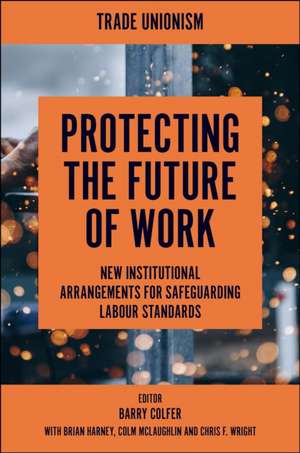Protecting the Future of Work: Trade Unionism
Editat de Barry Colfer, Brian Harneyen Limba Engleză Hardback – 20 ian 2023
Preț: 615.46 lei
Preț vechi: 759.82 lei
-19% Nou
117.78€ • 121.68$ • 98.03£
Carte tipărită la comandă
Livrare economică 25 martie-08 aprilie
Specificații
ISBN-10: 1800712499
Pagini: 192
Dimensiuni: 157 x 235 x 15 mm
Greutate: 0.44 kg
Editura: Emerald Publishing Limited
Seria Trade Unionism
Descriere
Institutions such as trade unions that were once relied upon to protect workers’ wages, conditions and job security are eroding. In response, new forms of worker protections are emerging.
Protecting the Future of Work examines new forms of regulation that have emerged in response to increasing social concern about poor labour practices, growing inequality, and detrimental working conditions. It looks at how trade unions, community organisations and other actors have mobilised to raise public awareness and pressure businesses and governments to improve working conditions.
Featuring a balance of texts on the changing nature of and the history of trade union change and transformation, the series Trade Unionism gives space for in-depth, detailed analysis and captures key themes on the nature of internationalism and trade unionism.
Notă biografică
Brian Harney is Professor of Strategy and HRM at Dublin City University Business School. His research explores the intersection of strategy and employment relations with a particular focus on small, growing and knowledge intensive firms.
Colm McLaughlin is Professor of Employment Relations at the UCD College of Business, University College Dublin, and Co-Director of the UCD Centre for Business and Society (UCD CeBaS). His research focuses on comparative and institutional employment, comparing the effectiveness of employment regulation in achieving public policy outcomes around decent work and equality.
Chris F. Wright is an Associate Professor in the Discipline of Work and Organisational Studies at the University of Sydney Business School. His research focuses primarily on migrant labour, comparative employment relations and sustainable supply chains.
